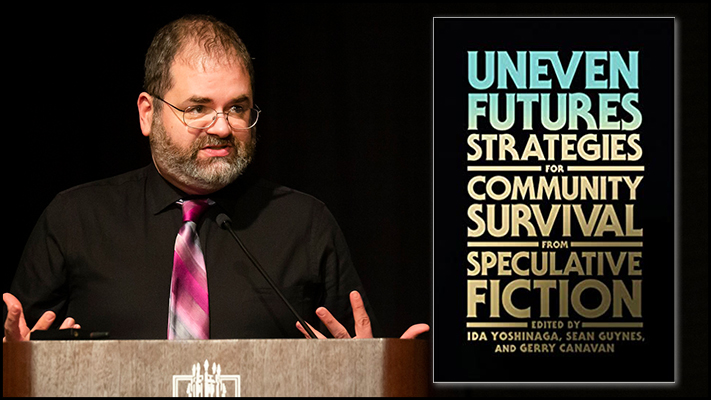Co-edited by Dr. Gerry Canavan, chair and associate professor of English

The explosion in speculative/science fiction across different media from the late 20th century to the present has compelled those in the field of science fiction studies to rethink the community’s identity, orientation and stakes. In this edited collection, more than 40 writers, critics, game designers, scholars and activists explore core science fiction texts, with an eye toward a future in which corporations dominate both the means of production and the means of distribution, and governments rely on powerful surveillance and carceral technologies.
Learn more or purchase this book on MIT Press
Canavan answered some questions about his new book, including his favorite part of the writing process, what he hopes the book can accomplish and how this book can advance the conversation in science fiction studies.
Uneven Futures brings together leading scholars and artists working in speculative fiction to talk about what science fiction, fantasy, and horror can teach us about surviving the 21st century.
I had a lot of fun with my own contribution, on the legendary 1980s superhero comic Watchmen; it came out of the course on Watchmen I taught at Marquette in fall 2020 and was a great extension of that work. I also just had a blast reading everyone else’s chapters — it was a really fun project that began with enthusiasm because in the end we are all fans of the genre, people who in one way or another have devoted our lives to it, and it was nice to just gush about things we loved.
It came out of discussions I was having with my co-editors, Sean Guynes and Ida Yoshinaga, at conferences about the present and future of science fiction studies, and, in particular, finding ways to explore a “new canon” that was more diverse and closer to the present than the typical histories of science fiction would have it. We developed this idea to allow people to pick any one text from speculative fiction (with no other guidelines than that) and tell us why it was important, and what it has to teach us about the political challenges of the present.

I’m a writer and editor in science fiction studies; this book comes out of other work I’ve done in the field and was an attempt to develop a new mode of publishing and commentary for the field with more crossover potential into other sectors of science fiction fandom and the mainstream.
This is Canavan’s fourth co-edited collection, including “Green Planets: Ecology and Science Fiction” (2014), “The Cambridge History of Science Fiction” (2019) and “The Cambridge Companion to American Science Fiction” (2015). He is also the author of “Octavia E. Butler” (2016) in the Modern Masters of Science Fiction series.
I hope the book brings attention to some of the amazing work in speculative fiction that was chosen, some of which I was quite familiar with and others of which I was only learning about for the first time from our writers. I hope too it sparks some optimism about the future in a time where it’s very easy to be pessimistic; we use the word utopia a lot in the book, not because we are naïve but because as a collective we are committed to building a future that looks better than the present.
Science fiction studies is my area of specialty, in both my research and my teaching, so this is right in my wheelhouse in terms of what I typically write and work on. What I’m excited about in this book is the hope that its wide scope and low price will help those of us in the scholarly science fiction community get a bit more visibility in fan circles that we’ve had; I think there could be some really interesting conversations there if only we could get talking.
Are there any other Marquette connections to the topic or development process of your book?
The list of contributors includes Dr. Ben Pladek, associate professor of English at Marquette.
If you have recently published a book, or if you have one coming out, we would like to feature your publication in an upcoming Marquette Bookshelf feature. More information on the submission process is available online.
Book Details
- Publisher : The MIT Press (December 20, 2022)
- Language : English
- Paperback : 360 pages
- ISBN-10 : 026254394X
- ISBN-13 : 978-0262543941


